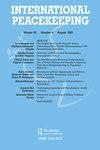Beyond Dues: The Role of U.S. Military Aid in UN Peacekeeping Operations
IF 1.3
2区 社会学
Q2 INTERNATIONAL RELATIONS
引用次数: 2
Abstract
ABSTRACT Shortfalls in personnel are common across UN peacekeeping operations (PKOs). An ongoing concern is that many PKOs lack sufficient resources to effectively fulfil their mandates. This may in turn be a major contributing factor to shortages of peacekeepers. How do provisions of non-personnel resources to UN PKOs shape other states’ voluntary commitments of peacekeeping personnel? This study focuses on the role of the U.S.’s voluntary peacekeeping assistance as a mechanism for reducing personnel shortfall. By providing additional assistance for specific peacekeeping operations, the U.S. enhances the ability of states that are willing but lack the resources to deploy peacekeepers and increases the willingness of states that are otherwise reluctant to make personnel commitments to these operations. In turn, these provisions of support lead to greater personnel commitments to the missions where the U.S. allocates this aid. Results from an analysis of U.S. peacekeeping assistance and personnel commitments within UN operations from 2000 to 2015 indicate that these aid provisions lead to reductions in shortfalls of peacekeepers. These findings suggest that the U.S. not only increases collective personnel commitments by providing this additional assistance but, in doing so, may also enhance the effectiveness of the missions it supports.超越决斗:美国军事援助在联合国维和行动中的作用
人员短缺是联合国维和行动中普遍存在的问题。一个持续的关切是,许多维和行动缺乏足够的资源来有效地履行其任务。这可能反过来成为维持和平人员短缺的一个主要因素。向联合国维和行动提供的非人员资源如何影响其他国家对维和人员的自愿承诺?本研究的重点是美国自愿维和援助的作用,作为一种机制,以减少人员短缺。通过为具体的维和行动提供额外援助,美国增强了那些愿意但缺乏资源部署维和人员的国家的能力,并增强了那些不愿为维和行动作出人员承诺的国家的意愿。反过来,这些支持条款会导致更多的人员投入到美国分配援助的任务中。对2000年至2015年联合国行动中美国维和援助和人员承诺的分析结果表明,这些援助条款导致维和人员短缺的减少。这些发现表明,通过提供这种额外的援助,美国不仅增加了集体人员承诺,而且这样做还可以提高其支持的任务的有效性。
本文章由计算机程序翻译,如有差异,请以英文原文为准。
求助全文
约1分钟内获得全文
求助全文

 求助内容:
求助内容: 应助结果提醒方式:
应助结果提醒方式:


